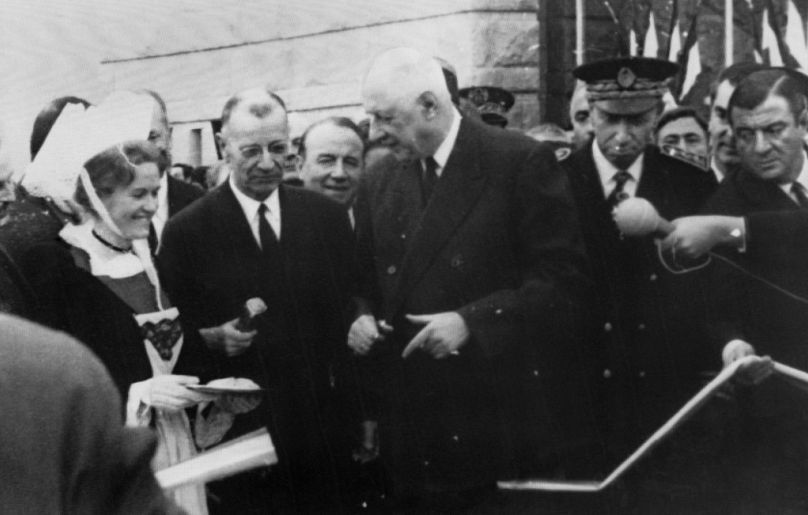By June 1940, France had given up the fight against Adolf Hitler. Charles de Gaulle wasn't having any of it.
On June 18, 1940, Charles de Gaulle, then a relatively unknown brigadier-general in the French army, gave a radio address from London via the BBC.
 ADVERTISEMENT
ADVERTISEMENT
 ADVERTISEMENT
ADVERTISEMENT
Two days earlier, De Gaulle had fled Nazi-occupied France for Britain, refusing to accept the capitulation to Adolf Hitler under Marshall Philippe Pétain and vowing to fight on from exile.
Speaking on the radio, De Gaulle urged French soldiers that did not want to capitulate to travel to London and join him. He said that the French forces would fight alongside the British against the Nazis in Europe.
"Nothing is lost for France. The same means that overcame us can bring us victory one day. For France is not alone," he said.
Only a handful of people are believed to have heard the actual broadcast, according to historian Julian Jackson in his recent biography, which was not recorded by the BBC. Despite the icon he would become, De Gaulle was a relatively minor figure in French politics and virtually unknown in France in 1940.
Far better known was Pétain, called the Lion of Verdun for his leadership during one of the most decisive battles of World War I. It was Pétain who had agreed to the armistice with Hitler that took France out of the war and made it an effective vassal of the Nazi regime.
De Gaulle was also virtually unknown when he arrived in London, and although he would be accepted by British Prime Minister Winston Churchill as the leader of what would become the Free French, his relationship with Churchill was at best complicated and at worst dysfunctional.
Wartime leader
On a number of occasions, Churchill was urged to abandon De Gaulle, whose patriotism, intelligence and strength of character was combined with stubbornness and capacity for unbridled rage that became legendary in the corridors of power in London.
In his book, Jackson relays an extraordinary occasion when De Gaulle smashed a chair on the floor in Churchill’s office during a row over the direction of the war and his role in it.
But as the Pétain government shifted from accommodating the Nazis to outright collaboration and the conflict began to tip into the Allies favour, De Gaulle’s status as a figurehead of the French resistance became unquestionable. When France was liberated in 1945, it was De Gaulle that was appointed head of the provisional government in Paris.
Although his first stint as leader of France would be short-lived - he resigned as president in January 1946 - he returned to power in 1958 to usher in the Fifth Republic. In 1962, he ended the war in Algeria and won a referendum that hugely increased the power of the presidency.
De Gaulle was forced to resign the presidency in 1968 in the face mass strikes and demonstrations across France, as well as the failure of his referendum on further political reform. But despite this, De Gaulle has cast a long shadow in French politics.
Legacy
From his successor and former aide Georges Pompidou up to France’s current president Emmanuel Macron (whose first official photograph included a copy of De Gaulle’s memoirs on his desk) the image of De Gaulle as the uncompromising patriot who led France to its freedom from Nazi rule has been central to the rhetoric of politicians from both left and right.
Speaking on June 18, 2020, leaders as politically divergent as the leftist Jean-Luc Mélenchon to the far-right Marine Le Pen paid tribute to De Gaulle and sought to shoe-horn his politics into their own. Mélenchon argued that De Gaulle “never joined the invisible hand of the market” while Le Pen described her party as the natural heir to the great wartime leader in France.
Speaking at the Invalides in Paris, Macron instead addressed a veteran of the Free French that had fought in 1945 to liberate France.
“We must be inspired by this strength of soul,” he said. “Your courage, your virtue in the Roman sense, are a source of pride for our country and still inspire us. We will make sure every child knows what he owes you.”











